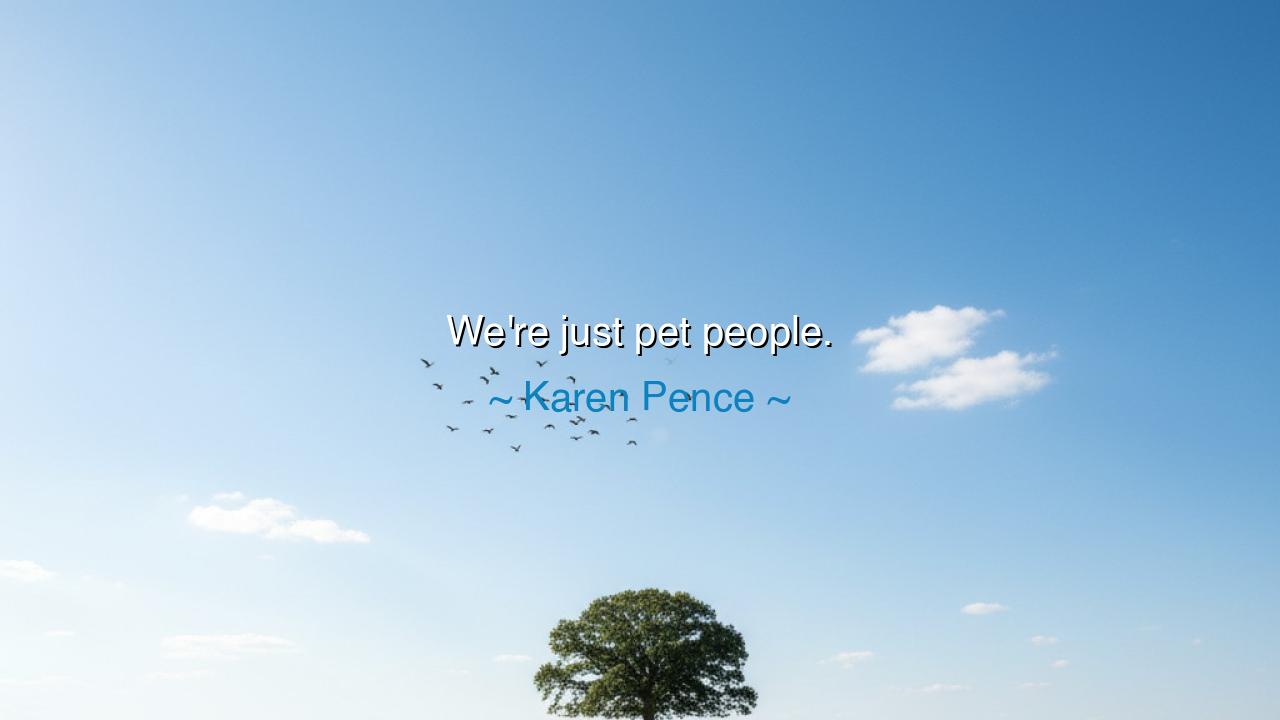
We're just pet people.






Hear, O children of gentleness and guardians of life, the words of Karen Pence, who spoke simply: “We’re just pet people.” At first glance, these words appear light, almost casual, but within them rests a truth that has endured since the dawn of humankind—that the bond between man and beast is not merely convenience, but covenant, not merely possession, but companionship.
To call oneself pet people is to confess a way of living, a shaping of the heart. It is to say: we choose to open our homes to creatures smaller and more vulnerable than ourselves, to share our food, our time, our hearth, and even our grief when they pass. In this way, to be a pet person is not a hobby, but a philosophy, a declaration that love need not be limited to humankind.
For ages, humankind has walked side by side with animals. The dog guarded our fires, the cat watched our grain, the horse bore us into battle and into labor. Yet beyond their usefulness, they gave us something greater: loyalty, affection, companionship. To be a pet person is to honor this lineage, to acknowledge that the creature at your side is not lesser, but kin—teaching us patience, responsibility, and the meaning of care that expects no reward.
Consider, O listener, the tale of Hachikō, the faithful dog of Japan. Each day, he waited for his master at the train station, and even after his master’s death, he returned daily for nearly ten years, until he himself passed away. His loyalty moved an entire nation, and a statue now stands in his honor. This is the power of the bond between humans and pets: a devotion so pure that it transcends death itself. When Pence declares, “We’re just pet people,” she stands in this ancient tradition of honoring such bonds.
The meaning of these words, then, is clear: to be pet people is to recognize that compassion extends beyond our own species. It is to welcome the lessons animals give us—joy in the present, love without condition, loyalty without expectation. It is to accept that in caring for them, we ourselves are made more human, more tender, more whole.
The lesson for you, O child of tomorrow, is this: embrace the creatures entrusted to your care. If you have a pet, treat it not as property, but as a companion in life’s journey. Feed it with faithfulness, comfort it with affection, and learn from its ways. If you do not, still honor the creatures of the world—protect them, respect their place, and see in them reflections of life’s great unity.
Practical action follows: if your heart allows, open your home to an animal in need. If not, then open your spirit to their presence in the world. Walk among them with humility, knowing they are teachers as much as dependents. Show your children how to treat them with kindness, for in so doing you plant seeds of compassion that will bear fruit in every human relationship they form.
Therefore, remember the wisdom hidden in Pence’s gentle phrase: to be pet people is not small, but noble. It is to live in harmony with creation, to guard the weak, to celebrate joy in its purest form. Walk this path, and you will discover that in loving animals, you are also learning how to love humanity more fully—and in truth, how to love life itself.






AAdministratorAdministrator
Welcome, honored guests. Please leave a comment, we will respond soon